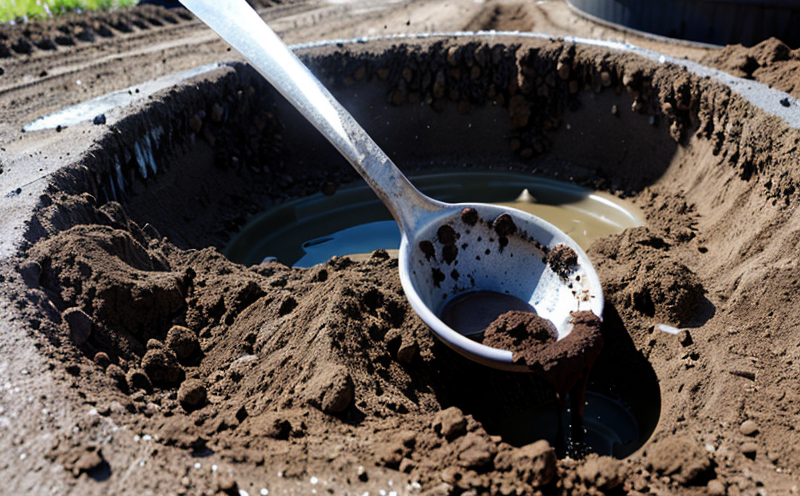APHA 2540G Total Solids in Biosolids Test
The APHA 2540G method is a standardized protocol used to determine the total solids content of biosolids, which plays a critical role in wastewater treatment processes. This test assesses both dry and volatile matter in biosolids, providing essential data for quality control and compliance with regulatory standards.
The process involves drying the sample at 103 ± 2 °C until constant weight is achieved to measure total solids content. Volatile solids are then determined by incinerating the dried sample at 550 ± 10 °C, which helps in assessing the organic matter present. The results from these two steps provide a comprehensive understanding of the biosolids composition.
This test is crucial for various stakeholders including quality managers responsible for ensuring consistent product quality, compliance officers aiming to meet regulatory requirements, and R&D engineers working on improving treatment processes. Additionally, procurement teams can use this information to select suppliers based on quality standards.
The significance of total solids in biosolids lies in its direct impact on the efficiency of wastewater treatment plants (WWTPs). High levels of total solids can lead to clogging issues within pipelines and filters, increased operational costs due to frequent maintenance, and higher energy consumption. On the other hand, low levels may indicate incomplete processing stages or inefficient operations.
Understanding total solids content also aids in optimizing landfill practices by providing insights into biodegradability potential. This knowledge helps in deciding whether biosolids should be used as fertilizer or disposed of through other means. Furthermore, it contributes to environmental sustainability efforts by promoting responsible resource management and waste reduction strategies.
Biosolids testing according to APHA 2540G supports decision-making processes across multiple sectors such as municipal utilities, private wastewater treatment facilities, agricultural enterprises, and environmental consulting firms. By accurately measuring total solids content, these organizations can ensure they are adhering to best practices while minimizing adverse effects on both internal operations and external ecosystems.
In conclusion, the APHA 2540G method serves as an indispensable tool for assessing biosolids quality. Its accurate results contribute significantly towards maintaining efficient, eco-friendly wastewater treatment systems that meet current and future challenges faced by our industry.
- Achieve consistent product quality through precise measurements.
- Ensure regulatory compliance with established standards.
- Evaluate the efficiency of your wastewater treatment processes.
- Select high-quality suppliers based on reliable test results.
- Optimize landfill practices by understanding biodegradability potential.
- Promote environmental sustainability and responsible resource management.
Why It Matters
The importance of the APHA 2540G Total Solids in Biosolids Test cannot be overstated. Accurate measurement of total solids content is essential for ensuring optimal performance and efficiency within wastewater treatment facilities.
Biosolids, which are the solid byproducts resulting from the biological treatment process in WWTPs, contain various components such as organic matter, minerals, microorganisms, and other materials. Understanding these constituents helps operators make informed decisions regarding further processing steps or disposal methods. For instance, if total solids levels are too high, it might indicate an overgrowth of certain organisms during digestion phases, necessitating adjustments in operational parameters.
On the contrary, low total solids content could suggest incomplete degradation processes, leading to inefficiencies and potential environmental impacts if not managed properly. Therefore, regular testing using methods like APHA 2540G becomes vital for maintaining balanced ecosystems around WWTPs and minimizing negative externalities associated with improper waste management practices.
Moreover, regulatory bodies often mandate compliance with specific limits on total solids content in biosolids before they can be used as agricultural amendments or disposed of through landfills. Failure to meet these standards could result in penalties and reputational damage for companies involved in wastewater treatment operations.
In summary, the accurate determination of total solids content via APHA 2540G ensures not only efficient internal operations but also contributes positively towards sustainable development goals pursued by many organizations today.
Why Choose This Test
- Standardization: The APHA 2540G method adheres to widely recognized international standards, ensuring consistency and reliability across different laboratories.
- Expertise: Our team of experienced analysts brings extensive knowledge in biosolids analysis, guaranteeing accurate results every time.
- Compliance: We help you stay ahead of regulatory requirements by providing data that meets stringent industry standards.
- Rapid Turnaround Times: Our streamlined processes allow quick turnaround times without compromising on precision or accuracy.
- Detailed Reporting: Comprehensive reports provide not just numbers but also interpretations and recommendations for improvement where necessary.
- Cost Efficiency: By identifying issues early, this testing minimizes costly remediation efforts later down the line.
Choosing our APHA 2540G Total Solids in Biosolids Test ensures that you receive reliable, accurate information about your biosolids composition. This knowledge empowers better decision-making processes and fosters sustainable practices within your organization.
Quality and Reliability Assurance
We understand the critical nature of quality and reliability in biosolids testing. That's why we've implemented stringent quality control measures throughout our entire process, from sample collection to final report generation.
To begin with, samples are collected under controlled conditions to ensure they represent the true composition of the biosolids being analyzed. Next comes thorough preparation procedures, where each step is meticulously followed according to the prescribed methodology outlined in APHA 2540G. This includes precise weighing and drying techniques that minimize errors and variations.
Our highly trained analysts then conduct the tests using state-of-the-art equipment calibrated regularly against certified reference materials. The use of advanced instrumentation ensures accurate readings, which are cross-checked multiple times to catch any discrepancies early on.
Data processing involves detailed calculations based on internationally accepted formulas, ensuring that all figures reflect real-world scenarios accurately. Finally, our team reviews the entire dataset before generating reports, making sure no anomalies slip through unnoticed.
By maintaining such high standards, we provide you with confidence in every result produced. Whether it's for internal use or submission to regulatory authorities, knowing your data is accurate and reliable goes a long way towards building trust both internally and externally within your organization.





